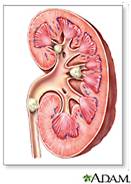1. DRINK ENOUGH FLUIDS.
Drinking enough fluids each day is the most important thing you can do to prevent kidney stones.
 This prevents substances in the urine from concentrated enough to form stones. The current recommendation is to drink 2 to 3 liters (34 to 68 fluid ounces) of fluid each day. Water is best, though other fluids may also count toward your total fluid intake.
This prevents substances in the urine from concentrated enough to form stones. The current recommendation is to drink 2 to 3 liters (34 to 68 fluid ounces) of fluid each day. Water is best, though other fluids may also count toward your total fluid intake.
2. LIMIT DIETARY SODIUM.Sodium, often from salt or soy sauce, causes the kidneys to excrete more calcium into the urine. High concentrations of calcium in the urine combine with oxalate and phosphorus to form stones. Reducing sodium intake can help reduce the concentration of  sodium in the body. To reduce dietary sodium limit processed foods and foods from restaurants. Include more fresh fruits and vegetables and in your meals and snacks. If you are physically active you may regularly lose significant amounts of sodium in your sweat. If this is the case, you may not need to reduce dietary sodium, but do make sure you stay well hydrated by drinking plenty of water.
sodium in the body. To reduce dietary sodium limit processed foods and foods from restaurants. Include more fresh fruits and vegetables and in your meals and snacks. If you are physically active you may regularly lose significant amounts of sodium in your sweat. If this is the case, you may not need to reduce dietary sodium, but do make sure you stay well hydrated by drinking plenty of water.
3. LIMIT ANIMAL PROTEIN.
Western diets typically contain way more animal protein than necessary. Most of us can start by limiting protein servings at to not more than 2 to 4 oz per meal (no bigger than the palm of your hand). For people who are prone to form uric acid stones or who have a history of gout, limiting total animal protein intake to 6 oz or less per day is recommended. (Note, a 3 oz serving of meat is about the size of a deck of cards). Aim to fill half of your plate with salad and/or vegetables, and limit meat serving to the size of the palm of your hand.
4. GET ENOUGH CALCIUM.
For most people the goal is at least 800 mg of calcium per day via food or supplements. An 8 oz glass of milk contains about 300 mg of calcium and 6 oz of yogurt has about 150 gm. If taking supplements, know that the body doesn’t absorb more than about 600 mg of calcium at a time so it is best to take it twice a day instead of all at once. Calcium from food does not increase the risk of calcium oxalate stones. When there is calcium in the digestive tract calcium binds to oxalate from food and keeps it from entering the blood, and then being filtered through the kidneys where it can form stones.
5. ASK AN EXPERT.
If you have a history of kidney stones or are concerned that you are at high risk for them, ask your doctor for a referral to a Registered Dietitian (RD). An RD can give you specific dietary recommendations that will guide you in how TO eat, not just telling you how NOT TO eat. A dietitian help an individual to plan meals that lower the risk of forming kidney stones based on the type of stone they have formed in the past, and can tailor a diet to meet medical needs that also takes into account personal preferences and behaviors.
Link to more information on Preventing Kidney Stones.

